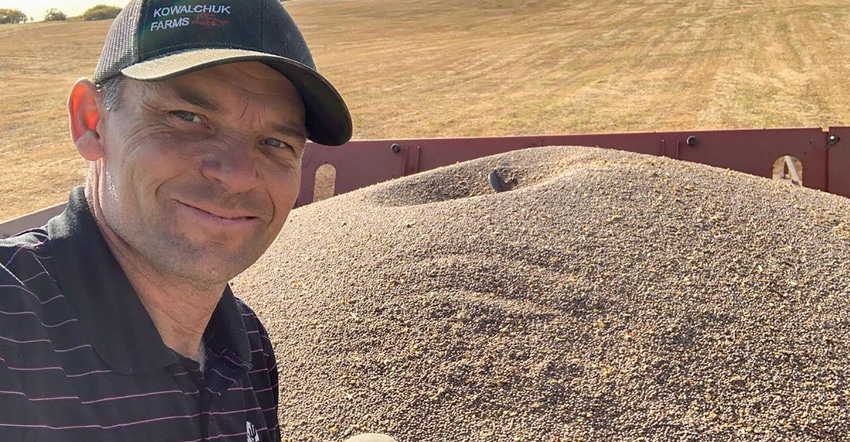
When COVID-19 hit Canada, John Kowalchuk had nowhere to go with his barley. Now, the Alberta farmer is rethinking crop options.
“My malt barley is a big one for reduced use across basically the whole world, because there's the sporting events and also the bars and restaurants that have been shut down,” he says. And the future does not look good.
He’s heard from buyers that only 70% of the malt barley will be accepted this year. Kowalchuk is coming to terms with the fact that some of what his farm produces may not be in high demand.
Related: Complete coronavirus coverage
Kowalchuk is a grain farmer from central Alberta. He has farmed for more than 30 years and grows up to seven different types of grain. He shared his story during the Future of Farming Dialogue sponsored by Bayer. He was one of four panelists that shined a light on how COVID-19 affected farmers across the globe, and he says it changed the way he looks at his farm’s future.
“It's not something that we haven't seen in the past,” Kowalchuk says, “but this is a whole new ballgame as far as demand across the world, as far as what we can grow, what people will buy, and what they will consume.”
Limit input access
In the Netherlands, like many other countries around the world, food supply was hit hard.
Restaurants, hotels and schools were shut down, says Heike Axmann, leader in Supply Chain Development and Logistic Design of Fresh Food Chains for Wageningen University. Excess food had nowhere to go.
“Food loss and waste increased mainly due to the southern border closures, the trade bans and lockdowns, and the restriction of transportation,” Axmann says. She added that these complications also hit farmers hard during the planting season with limited access to fertilizers, seed and labor.
“So, you can imagine that our food system is really at risk, and our farmers are really at risk under these circumstances,” she adds. She notes that actual food production might decrease.
“There is a potential risk that we have for a long-term increase in food insecurity, especially in the developed world due to this COVID-19,” she adds.
Axmann says farmers in her country are bracing for a second wave of COVID-19. “We need really immediate action to support those countries and those farmers.”
Work within a country
In Central America, Manuel Otero, director general of the Inter-American Institute for Cooperation on Agriculture, hears from farmers concerned about labor supply, availability of inputs and, more importantly, access to markets.
Otero works with its ministers of agriculture to communicate with farmers and authorities to, what he calls, “avoid these rushes of dread.”
He points to the workings of government, farmers and the private sector to keep agriculture moving forward in terms of inputs and labor. “It has been critical that agriculture has been deemed an essential service, thus helping individuals have the ability to keep on working despite shutdowns,” he says.
When it comes to markets, Otero says his area of Costa Rica averted taking protectionist measures. “At the same time, we have made efforts to help promote intraregional trade by developing applications that identify excess supply with unsatisfied demand in each of the countries, and in real time,” he adds.
Ag business dilemma
A health crisis showed how complex and fragile the global food system is, says Dirk Backhaus, head of product supply for the Crop Science division at Bayer.
Backhaus says there is a close connection from inputs coming from companies like Bayer and going on the farm — then to processers, traders, logistics and retail — to finally end up with consumers. “So, all of these elements have to work hand in hand,” he explains, “and I think this pandemic clearly showed that we had cracks.”
He says Bayer wanted to make sure farmers, like Kowalchuk, get the seeds and crop protection they need to continue planting and providing food for their countries.
“I would say even though we had hiccups here and there,” Backhaus says, “we didn't see major supply problems for the inputs to ag.” However, he says the real shock was on the demand side.
“Like the example of barley, like millions of liters of milk being thrown away from dairies, like vegetables ripening from smallholders that didn't find their way to markets in India,” he explains. It affects all farmers’ incomes. And that circles back to what farmers across the world will plant.
“It changes what we are selling next year,” Backhaus adds. “So, we also see this on the demand for soy seeds, for corn seed, or for cotton because textile demand is down.” Agriculture business is forced to rethink its development and sales plan because of the world health crisis.
Kowalchuk, like other farmers, is looking for answers to how COVID-19 might shape up in 2021 and affect demand for crops. “Hopefully going forward, we can get this figured out, so we can get the right crops into the right hands, so people can use what we grow," he says.
Read more about:
Covid 19About the Author(s)
You May Also Like






